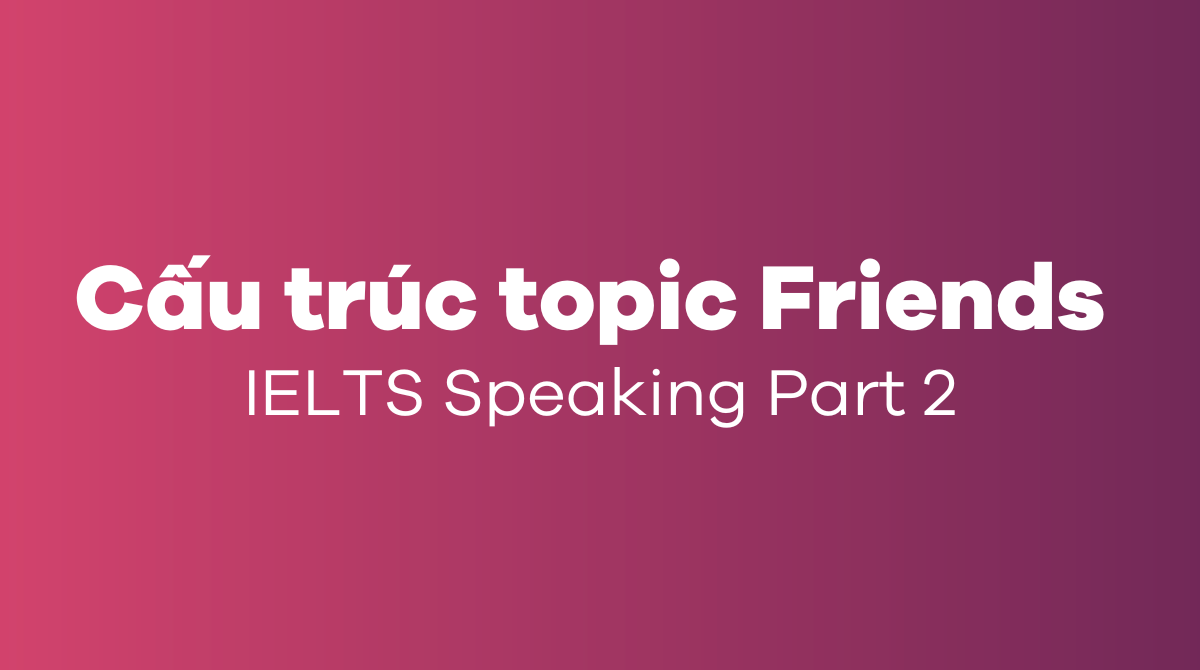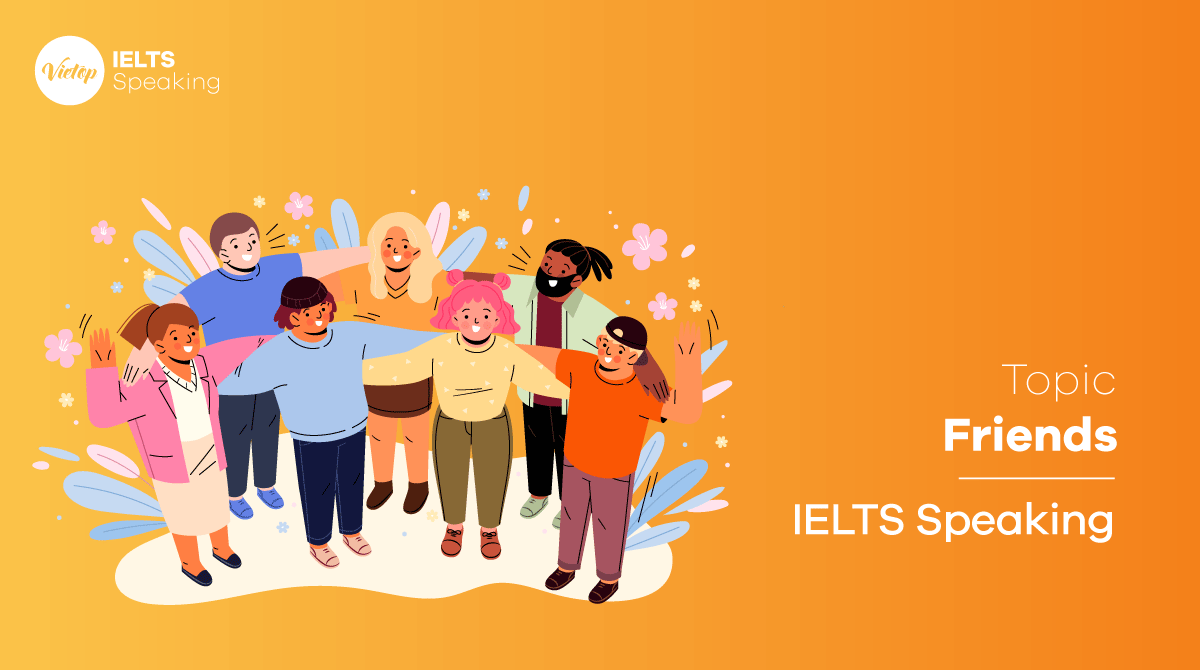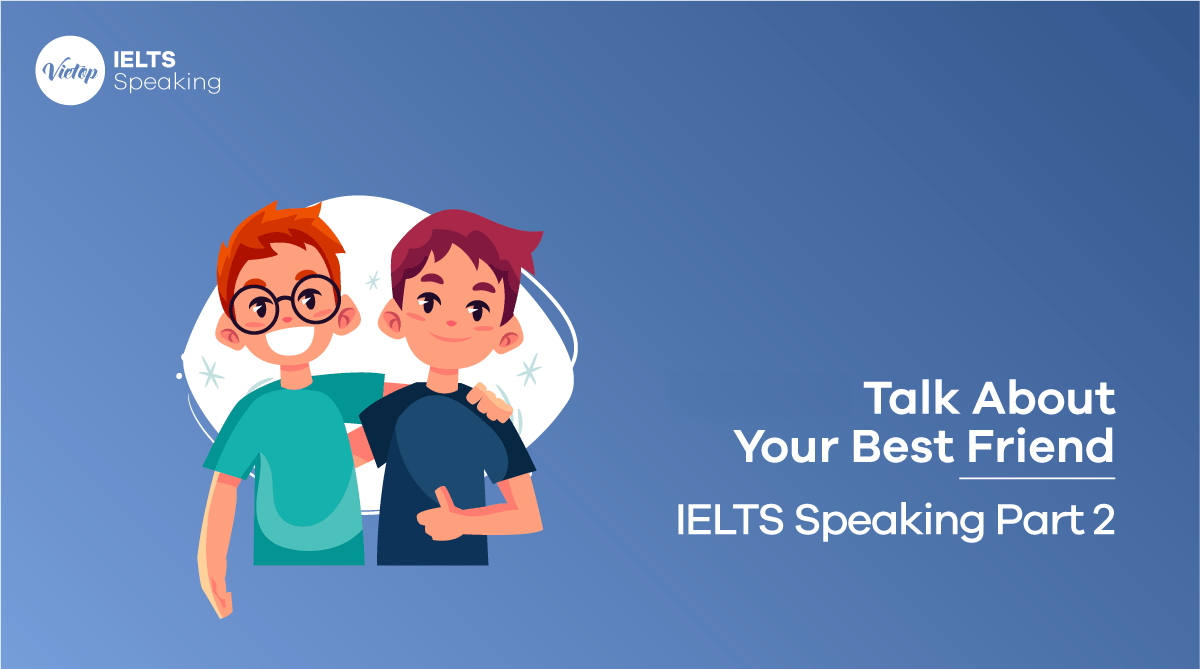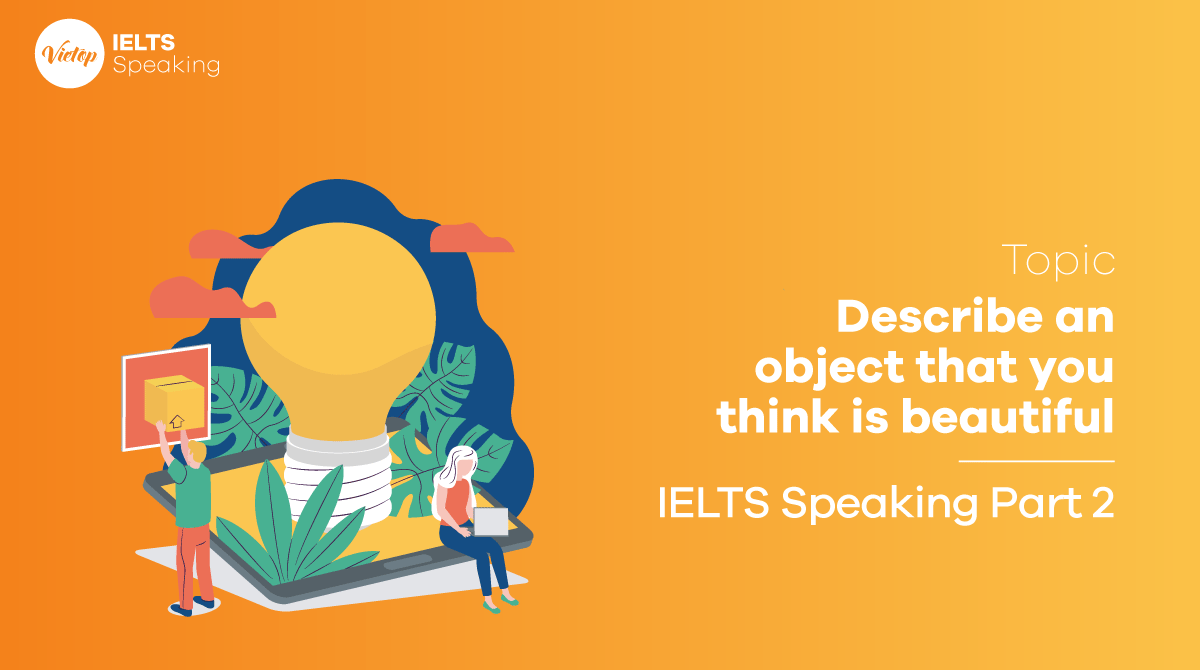Trong bài viết này Vietop sẽ giới thiệu đến bạn vốn từ vựng, cấu trúc câu thường dùng trong bài mẫu topic Friends IELTS Speaking Part 1, 2, 3 nhé. Lưu ý rằng đây là chủ đề rất thường gặp trong bài thi nhé. Cùng tìm hiểu ngay nào!
Cấu trúc topic Friends IELTS Speaking Part 2
Mở đầu
Phần mở đầu sẽ chỉ là 1 – 2 câu đơn giản, theo mẫu. Bạn nên chọn ra một số câu mẫu và học thuộc để có thể áp dụng hầu hết các chủ đề.
Một số câu mở đầu mẫu thường dùng trong bài IELTS Speaking Part 2:

Mẫu trực tiếp:
- I’d like to talk about…
- Let me tell you about…
- Today I want to talk about/tell you about…
- I am going to tell you about…
Mẫu gián tiếp:
- My favourite/closest friend/etc. was…
- The one I’d like to tell you about is…
- The one who/that stands out is…
- When it comes to …, there is only one off the top of my head.
Ví dụ như đề bài về “Describe your best friend” – miêu tả người bạn thân, ta sẽ có 2 cách vào bài như sau:
- Trực tiếp: So let me tell you about my best friend Jason, whom I have known for roughly 15 years.
- Gián tiếp: Well, when it comes to my closest friend, there is only one off the top of my head. His name is Jason and that guy sure has helped me a lot in my difficult times.
Thông tin cơ bản
Ở phần này trong topic FRIENDS, bạn sẽ đi vào việc kể lại vắn tắt thông tin về tên, tuổi, nơi ở và có thể công việc của người bạn đó.
Phần chính & cảm nhận
Phần chính này bạn sẽ nói dựa theo các bullet points mà đề bài cung cấp. Trong topic FRIENDS, thường thì đầu tiên sẽ là kể lại vắn tắt việc cả 2 gặp nhau và kết bạn như thế nào, sau đó đến miêu tả ngoại hình/tính cách của người bạn đó, những hoạt động cả hai làm cùng nhau, rồi cuối cùng là cảm nhận của bạn về họ.
Bạn lưu ý rằng chỉ cung cấp những thông tin mà đề bài yêu cầu, đi kèm với những từ vựng, cấu trúc ngữ pháp phù hợp giúp bạn lấy điểm. Bởi vì bài thi chỉ kéo dài trong 2 phút nên chúng ta không nên kể lể quá dông dài.
Kết thúc
Cũng như phần mở đầu, khi kết thúc bài nói bạn có thể dùng những câu mẫu để có thể “chốt” bài gọn gàng hơn. Dưới đây là một vài mẫu hữu ích mà bạn nên học và “biến tấu” đôi chút cho phù hợp hơn với đề bài được cho:
- So, basically, that’s it.
- So, that’s it.
- That’s all I have to say.
- That’s everything.
Ví dụ, để kết bài “Describe your best friend”, bạn có thể nói:
- So, basically, that’s all about my best friend Jason.
- So if I had to talk about my closest friend, it would have to be Jason. That’s all I have to say.
Xem thêm:
Topic Describe a famous person

Nhận tư vấn miễn phí khóa học hè
Từ vựng và cấu trúc câu thường dùng trong topic Friends – IELTS Speaking Part 2

Mình gặp người đó như thế nào? Mình biết người đó bao lâu?
- We go way back: chúng tôi đã quen nhau rất lâu rồi
- I’ve known him/ her for ….. years hoặc I’ve known him/her since …..: tôi đã biết anh ấy/ cô ấy được …năm hoặc tôi quen biết anh ấy/ cô ấy từ …
- To this day, I still remember vividly the first time we met was in …….: cho đến bây giờ, tôi vẫn nhớ rõ lần đầu tiên chúng tôi gặp nhau là …..
Ấn tượng đầu tiên của mình khi gặp người đó như thế nào?
- When I first met X, I was very impressed by his/her appearance/ voice/ style: Khi tôi lần đầu gặp X, tôi bị ấn tượng bởi ngoại hình/ giọng nói/ phong cách thời trang của anh ấy/ cô ấy
- My first impression X was that …: Ấn tượng đầu tiên của tôi về X đó là …
Tuổi tác
- X is the same age with me: X bằng tuổi với tôi
- X is + SỐ + years younger/ older than me: X thì nhỏ hơn/ lớn hơn tôi …tuổi
- X is in her teenage years: X đang trong độ tuổi thanh niên
- X is in his /her + early/ mid/ late + twenties/ thirties/ forties ….: X đang ở những năm đầu/giữa/cuối hai mươi/ ba mươi/ bốn mươi…
- X is ….. years old but he/she is still very young at heart: X đã…. tuổi rồi nhưng tâm hồn thì vẫn rất trẻ trung
Ngoại hình
Tham khảo những từ vựng miêu tả người căn bản:
|
Chiều cao | Tall (cao) Of medium height (có chiều cao trung bình) Short (thấp, lùn) Much/a little bit taller/ shorter than me (cao hơn/ thấp hơn tôi rất nhiều/ một chút) |
|
Dáng người | Slender (mảnh khảnh) Chubby (mũm mĩm) Well-built (vạm vỡ) Thin (ốm, gầy) Petite (nhỏ nhắn) Skinny (gầy trơ xương) |
|
Tóc | Straight hair (tóc thẳng) Curly hair (tóc xoăn) Wavy hair (tóc gợn sóng) Blonde hair (tóc vàng) Dyed hair (tóc nhuộm) |
|
Làn da | Has dark/ fair complexion/skin (có nước da đen/ trắng) Tanned skin (làn da rám nắng) |
Tính cách
Lưu ý: Trong Describe your best friend, các bạn không nên chỉ liệt kê một loạt các tính cách của người bạn mình mà hãy đi sâu diễn giải cụ thể hơn nói về một hoặc hai các tính cách nổi bật của người bạn đó.
Ví dụ:
Không nên: She is very humorous, talented, straightforward, sociable and generous
Nên: She has a great sense of humour. (Diễn giải) I mean she usually cracks me up with her jokes everytime we hang out together. Beside that, I really admire her because she can play the piano very well. (Diễn giải) She took up this musical instrument when she was a little kid and has won plenty of national and international awards.
Một số các nét tính cách thường gặp
Tham khảo những từ vựng tiếng Anh về tính cách con người thường gặp nhất nhé!
| absent-minded | đãng trí, hay quên |
| ambitious | tham vọng, nhiều hoài bão |
| approachable = friendly | thân thiện, dễ gần |
| bad-tempered | nóng tính |
| conservative | bảo thủ |
| creative | sáng tạo |
| down-to-earth | thực |
| dreamy | mơ mộng |
| generous | rộng lượng, hào phóng |
| hard-working | chăm chỉ |
| honest | chân thật, thật thà |
| humorous | vui tính |
| open-minded | cởi mở |
| reliable = trustworthy | đáng tin cậy |
| reserved | kín đáo, dè dặt |
| responsible | có trách nhiệm |
| self- confident | tự tin |
| shy | nhút nhát |
| sociable | hoà đồng |
| strict | khó tính, nghiêm |
| studious | chăm học |
| talented | tài năng |
| talkative | nói nhiều |
| thoughtful | tâm lý |
| witty | dí dỏm |
Xem thêm: Cách học bảng chữ cái tiếng Anh
Một số các cụm từ để mở đầu phần diễn giải về tính cách của bạn mình
- For example/ For instance, …
- I remember one time +S +V2/ed: Tôi nhớ có lần …
- The personality trait that I like most is that …: nét tính cách tôi thích nhất là …
- What I like most about X’s personality is that ….: điều tôi thích nhất về tính cách của X đó là …
- I mean …..: ý tôi là …
Cách chuyển ý
Với chủ đề Describe your best friend, khi các bạn muốn chuyển sang nói về một khía cạnh mới của người bạn của mình như tính cách, ngoại hình, cảm nhận của mình, hãy sử dụng những cụm từ sau để bài nói mạch lạc hơn.
- Moving on to talking about his/her personality/ appearance, S + V
- Speaking of his/ her personality trait/ appearance, S + V
- Talking a little bit about ….., S + V
Một số các từ vựng khác
| be there for me = have my back | giúp đỡ tôi |
| know me inside out | hiểu tôi rất rõ |
| share a lot of common interests with me | share a lot of common interests with me |
| we have a lot in common | chúng tôi có nhiều điểm chung |
| see eye to eye with SB about ST | có đồng quan điểm với ai về |
| hang out | đi chơi |
| have a argument | có một trận cãi nhau |
| lose touch | mất liên lạc |
| keep in touch with | giữ liên lạc |
Xem ngay: Khóa học IELTS 1 kèm 1 – Chỉ 1 thầy và 1 trò chắc chắn đạt điểm đầu ra
Bài mẫu topic Friends IELTS Speaking Part 1, 2, 3

IELTS Speaking Part 1
Mời mọi người nghe Audio topic Friends part 1 tại đây nhé!
Do you have a lot of friends?
I don’t have many because it would take a lot of time to keep in touch with everyone. I only have one best friend and moreover, I prefer spending my time maintaining a good friendship than having a lot of acquaintances.
- To keep in touch (v): giữ liên lạc
- To maintain (v): gìn giữ
- Acquaintance (n): xã giao
Do you keep in contact with friends from your childhood?
I don’t think so. It’s not because of any animosity. We simply drifted apart and lost touch. You know, as we grew older, we moved to different cities and countries, and we no longer share the same experiences or feelings.
- Animosity (n): sự bất hòa, thù địch
- To drift apart (v): tách xa nhau
- To lost touch (v): mất liên lạc
How often do you go out with your friend(s)?
Since we are quite busy working people, we only go out once a week. My best friend and I talk together about the place we should go on weekends and we usually end up at a nearby coffee shop, where we can sit and gossip about everything that happened to us the whole week.
- Working people (n): những người đi làm
- To end up (v): kết thúc, rốt cuộc
- Nearby (adj): gần đó
IELTS Speaking Part 2
Sample 1: Describe one of your best friends
Mời mọi người nghe Audio topic Friends part 2 – Sample: Describe one of your best friends tại đây nhé!
You should say:
- What this person looks like;
- When and where you met this person;
- What you do when you are together.
And explain why he/she is your best friend
Well, when it comes to my closest friend, off the top of my head, I would say it’s Tina. We go back a long way. In fact, we have been friends since my first year at university. To this day, I still remember vividly the first time I met her was in the grammar class. At first, I thought she was a talkative and graceless girl. However, as I got to know her more, I realized that Tina was a very loveable person and in fact we shared a lot in common.
When it comes to personality, I and Tina are complete opposites. While she is very approachable and patient, I am rather bad-tempered and reserved. To me, one of Tina’s most admirable personality traits is that she has good communication skills. I mean, she can easily strike up a conversation with anyone that she’s just met. As different as our personalities are, we see eye to eye with each other about a lot of things such as marriage, work and viewpoint of life.
Back in the days when we’re still at college, we hung out with each other every other week, mostly to the cinema or to the food stalls near our school. Now that we’ve graduated, I and she no longer see each other as regularly as we used to because both of us are always occupied with work. I only see her once every other month so we always have a lot of catching up to do.
I consider Tina my best friend for a couple reasons. Firstly, she really respects me and loves me for who I am. Secondly, despite having a hectic schedule, she‘s always willing to lend a sympathetic ear whenever I have problems or feel demotivated.
Tham khảo:
Vocabulary highlights
- Loveable: đáng yêu, dễ thương
- Are complete opposites: hoàn toàn đối lập nhau
- Strike up a conversation with: bắt chuyện với ai
- Occupied with work: bận bịu với công việc
- Lend a sympathetic ear: lắng nghe chăm chú
Sample 2: Talk about your best friend.

Mời mọi người nghe Audio topic Friends part 2 – Sample: Talk about your best friend tại đây nhé!
You should say:
- Who is he/she?
- When did you both meet for the first time?
- What do you usually do together?
And explain why you consider him/her your best friend.
So let me tell you about my best friend Jason, whom I have known for roughly 15 years.
Currently, Jason is an IT technician at a company in Ho Chi Minh City. It was in 2008, I first met him in grade 3 when he had just transferred from another school. It just so happened that on his first day, Jason couldn’t find an empty seat, while I was sitting alone thus I asked him to join me. We became friends since then, and our friendship has lasted till today.
Jason and I have been doing many things together. We have lots of mutual friends because we went to the same schools. On weekends, we usually throw parties or go on picnics. Today when we are both working people, whenever we have some free time, I would meet him at our favourite local coffee shop and sit for hours, gossiping about our daily lives.
Jason got married last year and now has a child. He’s changed a lot since we were students, but his personality still remained the same – always patient, open-minded, and easy to get along with. That’s the reason why I like him and consider him my best friend, despite the fact that we pursue different plans and goals.
So, basically, that’s all about my closest friend Jason.
- To transfer from another school (v): chuyển trường
- To last (v): kéo dài
- Mutual (adj): chung
- To gossip (v): nói chuyện phiếm
- To remain the same (v): y như cũ, giữ nguyên
- Open-minded (adj): cởi mở
- To get along with (v): hòa đồng với
Sample 3: Describe an object that you think is beautiful
Phần đầu chính là để giới thiệu khái quát cho giám khảo biết vật bạn muốn nhắc đến ở đây là gì. Có rất nhiều mẫu câu để mở đầu một bài mô tả đồ vật, ví dụ:

Mời mọi người nghe Audio topic Friends part 2 – Sample: Describe an object that you think is beautiful tại đây nhé!
- Well speaking of a beautiful object, I’m think i’m gonna go with
- Today let me tell you a short story about my …. \
Hoặc bạn có thể tùy biến mở bài sao cho phù hợp với món đồ vật bạn định nhắc đến.
Thân bài tập trung xây dựng các yếu tố về hình thức bên ngoài như màu sắc, hình dáng, vật liệu. Việc mô tả càng rõ ràng các chi tiết về ngoại hình sẽ giúp bạn có cơ hội vận dụng được hết vốn từ vựng của mình.
Phần cuối là để bạn lồng ghép một vài yếu tố cá nhân vào để xây dựng câu chuyện và hoàn tất nó. Bạn có thể giải thích sâu hơn một chút về việc tại sao bạn thấy đồ vật đấy đẹp, nó có khác biệt gì hơn so với những đồ vật tương tự, ai đó đặc biệt đã tự tay làm cho bạn chăng? ..
Lưu ý rằng tổng thời gian cho IELTS Speaking Part 2 chỉ là 2 phút. Bạn cần phải chắt lọc thông tin kỹ càng và logic nhất có thể để.
Bài mẫu cho chủ đề Describe an object that you think is beautiful
Chúng ta hãy cùng đến với một bài mẫu để hiểu hơn về dạng bài này nhé.
Describe an object that you think is beautiful
You should say:
What that object is
How it looks like
What that object was made
And explain why you find it beautiful.
Well, speaking of a beautiful object, I can’t help thinking of my very first working table. Sounds weird right because I know most of the people will list out something aesthetic like artworks or flowers or something else. But for me, my working table is the most beautiful thing and this is the reason why.
Firstly, it was 100% self-design by me. It’s a very long, walnut-color, multi-function table. It is inspired by the original concept from IKEA – one of the most popular furniture suppliers all over the world. Back then we were moving to the new place and we had to find some furniture to fit in our new house. And I found out that I was really obsessed with the IKEA monotone, minimal concept. So I decided to contact a wood shop and design my own table.
It is white, full white with a walnut color surface. It has two 2 types of drawers, the one on my left is pretty spacious to store all of my books. The one on my right is a stack of 3 drawers for my other hi-tech things such as phone chargers, laptop holders,… I feel pretty comfortable because everything I need is already within reach.
The best part of the table is its height can be adjustable. I mean, have you ever had to work and sit too long that your back hurts and you really want to change your working posture? My table has a motor to lift up the whole surface up to 1.5 meters, which means I can stand to work, literally. It helps manage my posture very well. If I am bored of standing, I can lower the table surface to make it move to the former position where I can sit comfortably again.
- Self-design: tự thiết kế
- Multi-function: đa dụng
- Drawer: học bàn
- Spacious: rộng rãi, nhiều không gian
- Within reach: trong tầm với
- Adjustable: có thể điều chỉnh được
IELTS Speaking Part 3
Mời mọi người nghe Audio topic Friends part 3 tại đây nhé!
What are the important qualities of a good friend?
I think it would base on each person’s definition of “what is a good friend”. For me, a good friend should always be a trustworthy and honest person. If you cannot trust someone, they are not a true friend and might stab you in the back one day, based on my experience.
- Trustworthy (adj): đáng tin cậy
- Honest (adj): thành thật
- To stab someone in the back (v): đâm sau lưng, chơi xấu ai đó
- Based on my experience: dựa vào kinh nghiệm của tôi
Do adults and children make friends in the same way?
I don’t think so. Usually, children make friends easier than grown-ups, when they see another person smiling and exchanging items, they will become friends. Adults, on the other hand, take their time making new friends since they have to discover common interests, build trust, and then will decide if they should build a long relationship with that person or not.
- Grown-up (n): người lớn
- To discover (v): khám phá
- Common (adj): giống nhau
- To build trust (v): xây dựng lòng tin
Do you think it is possible to become real friends with people you meet on the internet?
Yes. In a friendship, you need honesty, dependability, empathy, respect, and loyalty. If you get all of that from your online friends, you can consider them true friends. I have to say that I have more opportunities to make friends online than in real life.
- Honesty (n): sự thành thật
- Dependability (n): sự đáng tin cậy
- Empathy (n): sự đồng cảm
- Respect (n): sự tôn trọng
- Loyalty (n): sự trung thành
What do you think causes friendships to break up?
Lack of communication and distance can crack friendships. However, if you ask me why we break up with friends, I would say the main reasons are hypocrisy, selfishness, arrogance, lack of sympathy, and breach of trust. I used to have a close friend in university for 4 years but then we decided to stop being friends after a huge argument that led us nowhere.
- Lack of …: thiếu đi thứ gì đó
- Hypocrisy (n): đạo đức giả
- Selfishness (n): ích kỷ
- Arrogance (n): kiêu ngạo
- Breach of trust (n): mất lòng tin
- Argument (n): cãi nhau, tranh luận
- To lead someone to nowhere: không dẫn đến đâu cả
Hy vọng với những kiến thức mà Vietop đã chia sẻ ở trên bạn đã thu về cho mình một vốn từ vựng kha khá trong quá trình luyện thi IELTS. Hãy luyện tập IELTS Speaking một cách chăm chỉ để nhanh tăng band nhé!











